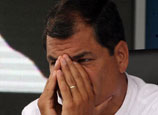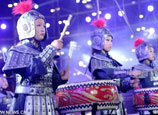
DUBAI, June 30 (Xinhua) -- Most conventional lenders and Islamic banks cleaned up their balance sheets from the debris of the financial crisis and switched to the expansion gear, with the Gulf Cooperation Council (GCC) banks' corporate banking divisions at peak levels in terms of revenues and net profits, according to a report published Friday.
"They even crossed the pre-crisis levels seen in 2008," said the corporate banking benchmarking report issued by the advisory firm Boston Consulting Group earlier on Friday.
Local lenders in the six GCC countries -- Saudi Arabia, Kuwait, Bahrain, Qatar, the United Arab Emirates (UAE) and Oman -- benefitted from relative political stability at home and capital outflows in turmoil-struck Arab nations such as Egypt and Syria as well as high oil prices, which gained 15.34 percent (U.S. crude) per barrel over the last 12 months.
Thanks to these tailwinds, GCC creditors expand at home and abroad as announcements in recent months proved. Net profits of GCC banks increased in the first quarter by 7 percent year on year to hit 4.6 billion U.S. dollars amid a rise in both loan activities and deposit volumes.
The UAE topped the first quarter ranking with profits edging up by 18.7 percent, followed by their counterparts in Qatar, Saudi Arabia and Kuwait, where net income increased by 7.3 percent, 2.6 percent and 2.4 percent, respectively on a yearly basis.
In Saudi Arabia, the biggest GCC country, lending grew in the first four months by nearly 5.5 percent, or about 1.05 trillion Saudi riyal (283.5 million dollars), the Saudi Gazette reported on June 13.
Meanwhile, Islamic banking takes shape in Oman, which was the last Gulf state to legalize banking in line with Islamic law or Shari'ah. Bank Nizwa started operations in January 2013 as the first Islamic bank in the southeastern Gulf state.
GCC bankers also strengthen their beachheads outside the region. Earlier last week, Kuwait's biggest lender NBK said it generated 22 percent of its income from outside the Northern Gulf state, the highest foreign share in profits ever.
NBK recently opened its first branch in Abu Dhabi, the capital of the UAE, where all local banks paid the state support back in the first half of the year.
In addition, Emirates Islamic Bank (EIB) announced that the buy- in of its rival Dubai Bank back in autumn 2011 had been successfully completed and that it will open more branches. "We are going to increase the number of branches from 38 to 48. We started hiring new staff and many of them are European bankers from those countries that were hit badly by the euro zone debt crisis," the EIB deputy CEO told Xinhua.
National Bank of Abu Dhabi (NABD) said Friday it would increase the share capital of its branch in Geneva, Switzerland, from 40 million Swiss francs (37.6 million dollars) to 140 million Swiss francs (131.6 million dollars).
On June 2, Raghavan Seetharaman, the chief executive of Doha Bank, one of the leading retail banks in Qatar, said he planned to expand to Hong Kong, India and Saudi Arabia to generate new growth in promising markets.
Al Baraka Banking Group, the oldest Islamic bank in Bahrain, looks more to the West, with its CEO Adnan Yousif saying in April, when presenting the bank's 5-year plan, that Al Baraka was eying Africa as the next stop in its global quest for growth.
















 Amazing skydiving tour in China's Liaoning
Amazing skydiving tour in China's Liaoning


![]()
